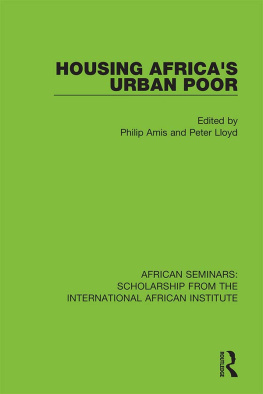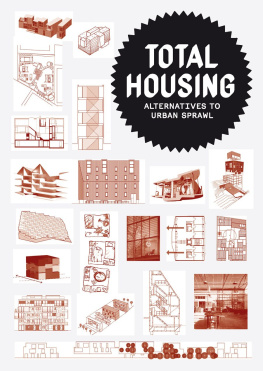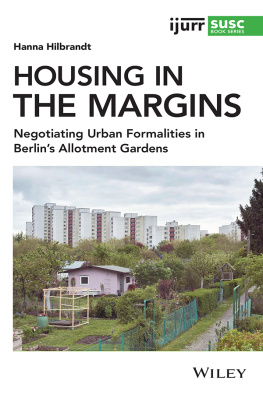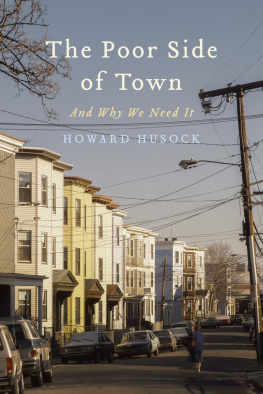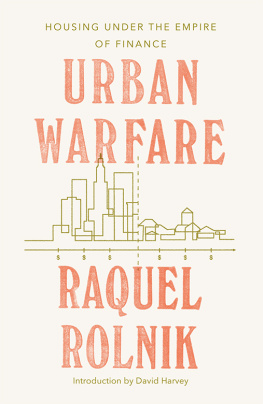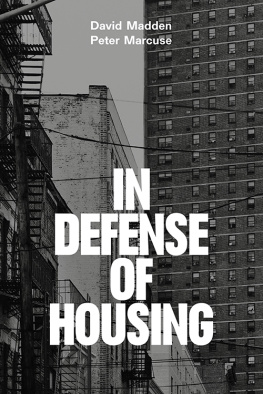
HOUSING INDIAS URBAN POOR 18001965
The hinge of this book is 15 August 1947, the day India became independent. The new leaders of the nation formulated many goals for Indias speedy development. Among these was the promise to provide all urban citizens with decent housing, and thus to clear all slums. This promise structures this book. It is divided into two sets of questions. The first one refers to the past. It was apparently necessary to express concern about the poor housing and sanitary provisions for many citizens before 1947. What was hence the situation of urban living during the approximately 150 years of colonial rule? What measures were taken (or not taken) for improvement? The promise to provide decent housing in independent India structures the second part of this book through a second set of questions. What were the public actions to bring the promise nearer by? What has been realized, what faded away finally? The analysis ends in the mid-1960s when the role of public actors with regard to housing and the living environment diminished and the idea of self-help and just marginal improvements of hut areas gained ground. Finally, some answers to the question why Indian society has as yet not been able to find adequate answers to the lack of decent housing for a majority of its citizens, are formulated.
The book brings detailed in-depth knowledge on urban housing and sanitation on several Indian cities together in a comparative manner and places this local knowledge in a broader context, crossing urban borders.
Hans Schenk worked at the University of Amsterdam, where he taught, did research and was involved in consultancies, with a focus on housing, planning and related aspects of urban Asia. He has published widely during the last 50 years, on many large and small Indian and other Asian cities.
First published 2021
by Routledge
2 Park Square, Milton Park, Abingdon, Oxon OX14 4RN
and by Routledge
52 Vanderbilt Avenue, New York, NY 10017
Routledge is an imprint of the Taylor & Francis Group, an informa business
2021 Hans Schenk and Manohar Publishers
The right of Hans Schenk to be identified as author of this work has been asserted by him in accordance with sections 77 and 78 of the Copyright, Designs and Patents Act 1988.
All rights reserved. No part of this book may be reprinted or reproduced or utilised in any form or by any electronic, mechanical, or other means, now known or hereafter invented, including photocopying and recording, or in any information storage or retrieval system, without permission in writing from the publishers.
Trademark notice: Product or corporate names may be trademarks or registered trademarks, and are used only for identification and explanation without intent to infringe.
Print edition not for sale in South Asia (India, Sri Lanka, Nepal, Bangladesh, Pakistan or Bhutan)
British Library Cataloguing-in-Publication Data
A catalogue record for this book is available from the British Library
Library of Congress Cataloging-in-Publication Data
A catalog record for this book has been requested
ISBN: 978-0-367-55410-1 (hbk)
ISBN: 978-1-003-09339-8 (ebk)
Typeset in Adobe Garamond 12/15
by Kohli Print, Delhi 110 051
I wasand I still amhappy that Mr Ramesh Jain of Manohar was immediately interested in publishing my manuscript and I thank the editorial staff of the publishers for their concerned and efficient efforts to transform it into a book.
The process of writing the manuscript was short and intensive, and it was saddening, angering and inspiring. It was saddening as I was once more confronted with the miseries of so many millions of Indian citizens who tried to find shelter. It was saddening to read about the failed attempts by some to provide for a few walls, a roof and perhaps even a tap to these millions, irrespective whether they made these attempts in the context of a colonial regime or after Indias Independence. It was even more saddening and angering to read about those who deliberately frustrated such attempts.
The process was also inspiring after all. A large number of outstanding in-depth studies on Indian towns and cities has been published over the years and they contribute to a huge pile of knowledge about urban India. My inspiration was fuelled by comparing much of this knowledge on different urban places and bring it here a bit together in a broader context than that of specific urban borders, but a context that remained after all the Indian one.
H ANS S CHENK
CHAPTER 1
Introduction
15 August 1947: India gains independence. Its leaders expressed their hopes and plans for the future of the new nation. Among the desires to develop the country and its inhabitants, and the confidence among many new citizens and its leaders that such developments were feasible, even likely since the colonizers had departed, were those on the poor housing conditions of urban citizens. The then minister of health, Rajkumari Amrit Kaur, stated in 1948: That our cities should be cleared of
Prime Minister Jawaharlal Nehru gave extra weight to this wish by almost casually stating that such a Existing slums could apparently be cleared, and better housing provided.
These statements of confidence found their origins in the awareness that at least a part of Indias urban citizens did not succeed in finding an acceptable shelter in one way or the other. An obvious next question is then how these citizens were housed at the time of Indias independence in 1947, and the kind of access they had to basic sanitation. In this essay I intend to explore in the first place in some detail the colonial period before 1947. How were the conditions of urban shelter during this period? Which improvement policies can be identified in the towns and cities of the colony? In this way I sketch some sort of a starting position upon which the Indian leaders could build their hopes and policies. I deal with obvious follow-up questions such as: were housing conditions and sanitary arrangements bad? If so then how bad? In what respect and for whom? What had been done to house the common man, or rather the poor, of the urban population in a better way? What had been the impact of such activities?
The period before 1947 is loosely defined. The end is definite, but the beginning is not. I have roughly taken the year 1800 as a start. The rationale is that colonial India started from the early nineteenth century. The British began then to build a colony, an Empire later, instead of running merely a number of trading posts in existing Indian cities or a few created settlements along the west and the east coast. The presidency towns Madras, Calcutta and Bombay are of course the best known examples of a subsequently and gradually created urban colonial India, but the British influence on other cities was also there, sometimes marginal, often considerable and even extreme in exceptional cases, such as Delhi.
Subsequently my focus is on how confidence and optimism regarding urban housing were operationalized during a first phase of Indias development, a phase ofsayfifteen years, and how actual measures could be evaluated. What was promised? What has been done with solemn statements, promises, etc., to provide better housing and sanitation for all urban citizens, than before independence, and by whom? What was successful, what were the failures and for whom? The year 1947 seems an obvious choice as a starting point to find answers to such questions. I have taken it, but with a small margin as it took a few years before independent India established institutions to tackle urban housing problems. The beginning of the But even before these emerging doubts were developed, and similar to the period before independence: by far the most urban citizens had to arrange their housing and sanitary needs themselves, sometimes helped, sometimesoften perhapshindered by all kind of authorities and others. This essay is therefore also a history of failure: the rise and decline of what never happened.




